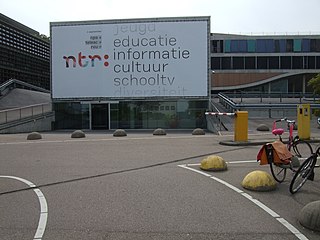Present-day telecommunications in Canada include telephone, radio, television, and internet usage. In the past, telecommunications included telegraphy available through Canadian Pacific and Canadian National.

The Canadian Broadcasting Corporation, branded as CBC/Radio-Canada, is the Canadian public broadcaster for both radio and television. It is a Crown corporation that serves as the national public broadcaster, with its English-language and French-language service units commonly known as CBC and Radio-Canada, respectively.
Public broadcasting involves radio, television and other electronic media outlets whose primary mission is public service. Public broadcasters receive funding from diverse sources including license fees, individual contributions, public financing and commercial financing, and avoid political interference or commercial influence.

National Educational Television (NET) was an American educational broadcast television network owned by the Ford Foundation and later co-owned by the Corporation for Public Broadcasting. It operated from May 16, 1954, to October 4, 1970, and was succeeded by the Public Broadcasting Service (PBS), which has memberships with many television stations that were formerly part of NET.
CBC Radio One is the English-language news and information radio network of the publicly owned Canadian Broadcasting Corporation. It is commercial-free and offers local and national programming. It is available on AM and FM to 98 percent of Canadians and overseas over the Internet, and through mobile apps. CBC Radio One is simulcast across Canada on Bell Satellite TV satellite channels 956 and 969, and Shaw Direct satellite channel 870.

Low-power broadcasting is broadcasting by a broadcast station at a low transmitter power output to a smaller service area than "full power" stations within the same region. It is often distinguished from "micropower broadcasting" and broadcast translators. LPAM, LPFM and LPTV are in various levels of use across the world, varying widely based on the laws and their enforcement.

The National Association of Broadcasters (NAB) is a trade association and lobby group representing the interests of commercial and non-commercial over-the-air radio and television broadcasters in the United States. The NAB represents more than 8,300 terrestrial radio and television stations as well as broadcast networks.

Frank Nicholas Stanton was an American broadcasting executive who served as the president of CBS between 1946 and 1971 and then as vice chairman until 1973. He also served as the chairman of the Rand Corporation from 1961 until 1967.
Graham Spry, CC was a Canadian broadcasting pioneer, business executive, diplomat and socialist. He was the husband of Irene Spry and father of Robin Spry, Richard Spry and Lib Spry.

The Canadian Association of Broadcasters (CAB) is a trade association representing the interests of commercial radio and television broadcasters in Canada. It is co-located with the Canadian Broadcast Standards Council in Ottawa.

The Nederlandse Omroep Stichting is one of the broadcasting organisations making up the Dutch public broadcasting system. It has a special statutory obligation to make news and sports programmes for the three Dutch public television channels and the Dutch public radio services. It is funded by the Dutch government.
Aboriginal Voices Radio Network was a Canadian radio network, which primarily broadcast music programming and other content of interest to aboriginal people. As of June 2015, the network operated stations in Toronto, Ontario, Calgary and Edmonton in Alberta, and Vancouver, British Columbia. All of its stations were licensed as rebroadcasters of its flagship station, CKAV-FM in Toronto. The network's administrative office was located in Ohsweken, Ontario, on the Six Nations Indian reserve near Brantford. The stations' music programming consisted mainly of adult contemporary music, along with specialty programs focusing on aboriginal-oriented content.
Religious broadcasting, sometimes referred to as faith-based broadcasts, is the dissemination of television and/or radio content that intentionally has religious ideas, religious experience, or religious practice as its core focus. In some countries, religious broadcasting developed primarily within the context of public service provision, whilst in others, it has been driven more by religious organisations themselves. Across Europe and in the US and Canada, religious broadcasting began in the earliest days of radio, usually with the transmission of religious worship, preaching or "talks". Over time, formats evolved to include a broad range of styles and approaches, including radio and television drama, documentary, and chat show formats, as well as more traditional devotional content. Today, many religious organizations record sermons and lectures, and have moved into distributing content on their own web-based IP channels.

CJSR-FM is a Canadian campus-based community radio station, broadcasting at 88.5 FM in Edmonton, Alberta. The CJSR studios are located in the Students' Union Building of the University of Alberta, while its transmitter is located atop the building.

CBC North is the Canadian Broadcasting Corporation's radio and television service for the Northwest Territories, Nunavut, and Yukon of Northern Canada as well as Eeyou Istchee and Nunavik in the Nord-du-Québec region of Quebec.

NTR is a Dutch public-service broadcaster, supplying television and radio programming of an informational, educational, and cultural nature to the national public broadcasting system, Nederlandse Publieke Omroep (NPO). NTR was created in 2010, following the merger of the Nederlandse Programma Stichting (NPS) and two educational broadcasters, Televisie Academie (Teleac) and the Radio Volksuniversiteit (RVU). For details of these predecessor organizations, see further below.

The Public Broadcasting Act of 1967 issued the congressional corporate charter for the Corporation for Public Broadcasting (CPB), a private nonprofit corporation funded by taxpayers to disburse grants to public broadcasters in the United States, and eventually established the Public Broadcasting Service (PBS) and National Public Radio (NPR). The act was supported by many prominent Americans, including Fred Rogers, NPR founder and creator of All Things Considered Robert Conley, and Senator John O. Pastore of Rhode Island, then chairman of the Senate Subcommittee on Communications, during House and United States Senate hearings in 1967.

CJSF-FM is a college radio station from Simon Fraser University in Burnaby, British Columbia. The station features a wide range of genres, from spoken word politics to heavy metal music shows. Its transmitter is located atop Burnaby Mountain.
Jean Adélard Pouliot was a Canadian broadcasting pioneer who helped establish television stations in Kitchener, Ontario, and Quebec City, Quebec. Pouliot was the president and CEO for the first publicly-traded Quebec broadcasting company, Télé-Capitale, and started two French language networks: TVA, and TQS.

The Radio Television Digital News Association of Canada, or RTDNA Canada, is a Canadian membership organization of radio, television and online journalists, news directors, producers, executives and educators. It was founded in 1962, as the Canadian equivalent of the Radio Television Digital News Association in the United States.












